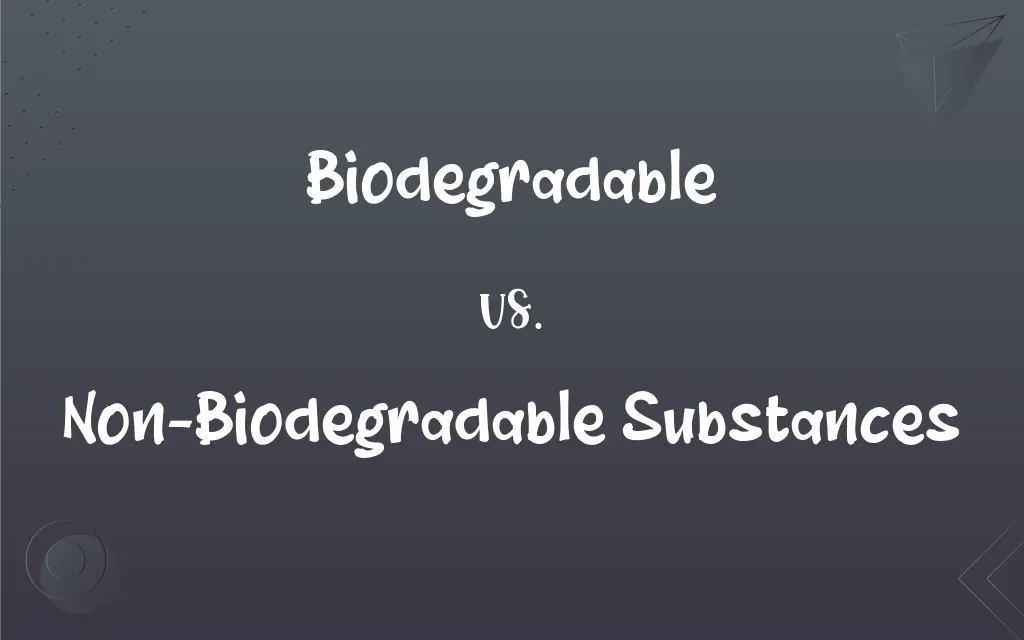Biodegradable vs. Non-Biodegradable Substances: What's the Difference?
Edited by Aimie Carlson || By Harlon Moss || Updated on October 14, 2023
Biodegradable substances break down naturally; non-biodegradable substances don't.

Key Differences
Biodegradable substances are materials that decompose through natural processes, while non-biodegradable substances resist decomposition and remain intact for long periods. Biodegradable items, such as food scraps and leaves, break down due to the action of microbes and other environmental factors. In contrast, non-biodegradable substances, like plastic bags and certain metals, remain in the environment without significant change.
Biodegradable materials have the advantage of returning to the earth safely. They often enrich the soil as they decompose, adding nutrients and fostering the next generation of flora. Non-biodegradable substances, on the other hand, can accumulate in the environment and may pose potential hazards. These substances don't integrate into the natural cycle and can remain as litter or pollutants.
Another distinction lies in their environmental impact. Biodegradable items typically have a lower environmental footprint since they can reintegrate into ecological systems. Non-biodegradable substances, on the other hand, may end up in landfills or the oceans, where they can take hundreds to thousands of years to degrade, if at all.
The timeframe for decomposition varies widely among biodegradable materials, from weeks to years. However, non-biodegradable substances persist much longer, often indefinitely, creating lasting environmental concerns. While biodegradable products offer a more sustainable approach, the persistent nature of non-biodegradable substances underlines the importance of recycling and proper waste management.
Biodegradable products are often perceived as more eco-friendly. They align well with the circular economy concept, where materials are used, recycled, and returned to the environment. Non-biodegradable substances challenge this ideal, demanding innovative solutions to reduce their environmental impact.
ADVERTISEMENT
Comparison Chart
Decomposition Time
Varies, but generally decomposes faster.
Takes a very long time, often centuries.
Environmental Impact
Generally eco-friendly; returns to earth safely.
Can cause long-term environmental harm.
Decomposition Agents
Acted upon by microbes, sunlight, etc.
Resists natural decomposition agents.
End Products
Carbon dioxide, water, minerals.
Remains largely unchanged.
Usage in Packaging
Often used for eco-friendly packaging.
Commonly found in traditional packaging.
ADVERTISEMENT
Biodegradable and Non-Biodegradable Substances Definitions
Biodegradable
Biodegradable refers to materials that can be decomposed by natural agents.
The biodegradable bag decomposed in a few months.
Non-Biodegradable Substances
Non-biodegradable denotes materials that don't return to the environment safely.
Non-biodegradable packaging contributes to global pollution.
Biodegradable
Biodegradable signifies the ability of materials to disintegrate under natural conditions.
Biodegradable utensils are preferred for outdoor events to minimize litter.
Non-Biodegradable Substances
Non-biodegradable items persist in the environment for extended periods without decomposing.
Landfills are burdened with non-biodegradable substances like electronic waste.
Biodegradable
Biodegradable items are environment-friendly, returning to nature without leaving residues.
Biodegradable cleaning products are safer for aquatic life.
Non-Biodegradable Substances
Non-biodegradable materials remain unchanged in nature, often causing environmental harm.
Non-biodegradable substances can endanger marine life when discarded improperly.
Biodegradable
Biodegradable substances break down into natural elements with time.
Using biodegradable plates reduces waste in landfills.
Non-Biodegradable Substances
Substances that resist natural degradation processes are termed non-biodegradable.
Cities are promoting the reduction of non-biodegradable substances in consumer products.
Biodegradable
Biodegradable materials undergo decomposition through microbial or environmental action.
The biodegradable waste was turned into compost for gardens.
Non-Biodegradable Substances
Non-biodegradable substances cannot be broken down by natural processes.
The beach was littered with non-biodegradable substances like plastic bottles.
Biodegradable
Capable of being decomposed by biological agents, especially bacteria
A biodegradable detergent.
Biodegradable
Capable of being decomposed by biological activity, especially by microorganisms.
Biodegradable
Any material that can be decomposed by biological activity.
Biodegradable
Capable of being decomposed by e.g. bacteria;
A biodegradable detergent
FAQs
Do biodegradable items turn into compost?
Many do, but it depends on the item and conditions it's exposed to.
What does biodegradable mean?
Biodegradable means that a substance can decompose naturally through microbial or environmental action.
How long does it take for biodegradable items to decompose?
The time varies, but biodegradable items generally decompose faster than non-biodegradable substances.
Are biodegradable products always safe for the environment?
While they're typically eco-friendlier, the overall impact depends on their production, usage, and disposal methods.
Are biodegradable plastics always a better alternative?
Not always. Their environmental benefit depends on production methods and the specific conditions they degrade under.
Can non-biodegradable substances be recycled?
Many can be, like certain plastics and metals, making recycling crucial.
Is it possible to reduce our use of non-biodegradable substances?
Absolutely, through conscious choices, sustainable alternatives, and promoting recycling.
What are examples of biodegradable substances?
Examples include food scraps, paper, and certain natural fabrics.
Can biodegradable substances harm the environment?
In certain conditions, yes. For instance, biodegradable plastics in the ocean may harm marine life.
How long do non-biodegradable items last in the environment?
Often indefinitely. Some, like plastics, can persist for hundreds to thousands of years.
What are common non-biodegradable substances we encounter daily?
Plastic bags, aluminum cans, and certain electronic components are everyday examples.
How can one differentiate between biodegradable and non-biodegradable products when purchasing?
Checking product labels and manufacturer details can provide insights.
How can we reduce the environmental impact of non-biodegradable substances?
Recycling, upcycling, and reducing our consumption of such items are effective strategies.
What are non-biodegradable substances?
These are materials that resist natural decomposition and remain unchanged for long periods.
Are all biodegradable items compostable?
Not necessarily. While many biodegradable items can be composted, the terms aren't synonymous.
Why are biodegradable items considered eco-friendly?
They return to nature, reduce waste in landfills, and often have a smaller carbon footprint.
Do non-biodegradable substances contribute to greenhouse gases?
Yes, especially when they decompose anaerobically in landfills, releasing methane.
Is the cost of biodegradable items higher than non-biodegradable ones?
Sometimes, due to sustainable sourcing and production methods, but prices are decreasing as demand grows.
Why are non-biodegradable substances problematic?
They accumulate in the environment, often causing pollution and harming ecosystems.
Can non-biodegradable items be biodegraded under specific conditions?
Some can break down under certain industrial conditions, but generally not in nature.
About Author
Written by
Harlon MossHarlon is a seasoned quality moderator and accomplished content writer for Difference Wiki. An alumnus of the prestigious University of California, he earned his degree in Computer Science. Leveraging his academic background, Harlon brings a meticulous and informed perspective to his work, ensuring content accuracy and excellence.
Edited by
Aimie CarlsonAimie Carlson, holding a master's degree in English literature, is a fervent English language enthusiast. She lends her writing talents to Difference Wiki, a prominent website that specializes in comparisons, offering readers insightful analyses that both captivate and inform.































































